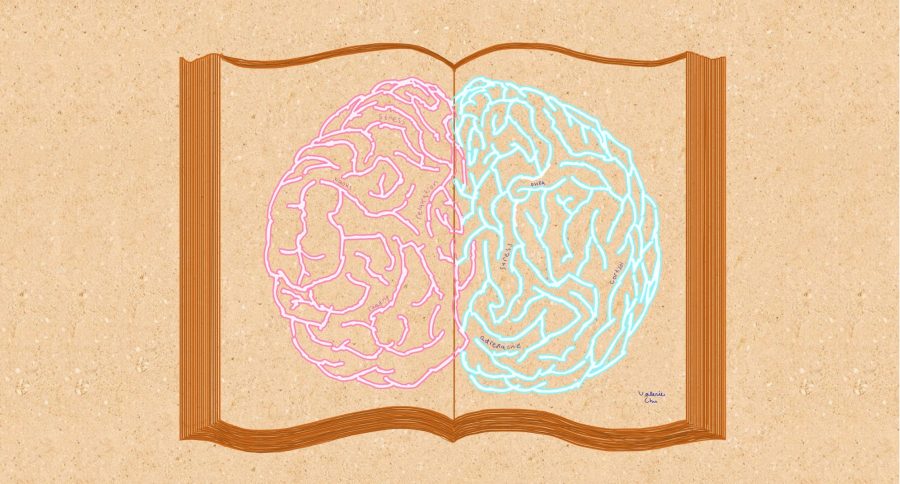Reaching up to the shelves, a student carefully selects a book from Paly’s library. With the crack of the plastic-enveloped cover unfolding, the waft of the signature book smell and the act of scanning the inside cover, the balance of stress hormones inside the student alter as the levels of certain stress hormones are reduced.
As the times change, so have the methods that students use to alleviate stress. But while some students turn to activities like social media, music or sports, others find relief in another fairly common activity: reading.
For students like sophomore Arran Kooner, reading is an activity that helps with relaxing and focusing on something besides school.
“It’s fun because I get to put my focus and energy into something that I like and that I can choose, which is cool,” Kooner said.
To Kooner, one of the biggest appeals of reading comes from picking up a book whenever he wants and being able to choose the world that he wants to be absorbed into.
“The best part about reading is all the different experiences you can have,” Kooner said. “You don’t have to be a random person living in Palo Alto. You can be a hero on a quest to kill a dragon, or you could see people’s different viewpoints.”
The ability to leave reality and delve into the lives of characters living in a world different from her own is something that sophomore Sage Loomis said she also appreciates.
Loomis said being able to escape her life and throw herself into someone else’s is one of the most valuable experiences that reading provides when it comes to dealing with stress.
“It gives you perspective and also kind of distracts you from whatever is bothering you for a bit,” Loomis said.
According to psychology teacher Christopher Farina, one of the biggest benefits of reading is the ability to block out everything that may be causing stress. Defined as a physiological response to some sort of outside stimulus, stress can often have a big impact on both a student’s mental and physical health, Farina said.
Typically, chronic stress can have a lot of adverse effects like anxiety, which is a combination of the psychological and physiological phenomenons of worry and stress. But according to Farina, one of the most surprising discoveries that has emerged from recent research is that by changing how stress is interpreted, it can become an advantage.
“Stress is not bad,” Farina said. “The way that we process stress seems to determine whether our experience with stress is bad or good.”
By viewing stress as something positive and something which gives your body energy and a challenge to be overcome, stress can be a useful tool in achieving success. But until then, reading can still be extremely useful when dealing with stress, Farina said.
“What it (reading) does is it allows you to not think about everything that is maybe intriguing on your thoughts,” Farina said. “It kind of walls out everything that’s banging on the door of your psyche and just lets you get lost in a world that is purely for your own information or entertainment.”
Both Kooner and Loomis said choosing a book and getting absorbed into the story can allow time to relax and experience the places they are reading about. But according to Loomis, reading can occasionally interfere with productivity.
“Sometimes I’ll spend an entire day reading and finish multiple books in the same day,” Loomis said. “When I’m really hooked on a book and it’s really interesting, I’ll stay up until the early hours of the morning reading and that can be bad for getting work done and also just general sleeping habits. If I’m not sleeping because I’m reading a really good series, that’s not necessarily good.”
The balance of finding the right amount of reading time in order to still get work done can help with lowering the levels of hormones like cortisol and raising the hormone dehydroepiandrosterone (DHEA).
“The ratio of stress hormones is really the key thing,” Farina said, referring to research mentioned in “The Upside of Stress” by Kelly McGonigal, an expert in the field of stress and psychology. “DHEA helps you recover (and) learn from stress. Cortisol is the one that’s more of the long-term destructive wear-and-tear kind of response on your body.”
According to Farina, reading is an activity that can block whatever is causing stress from the mind and lower the levels of certain hormones, even if reading will generally not affect the DHEA response or promote growth because the root of the problem is not being solved. Depending on the circumstances, reading can either be a temporary solution which simply blocks off stress for short periods of time, or a permanent solution that helps in avoiding thoughts about things that are yet to happen or things that cannot be changed anymore, according to Farina.
Although reading may or may not be a long-term solution to reducing stress, the benefits of reading still remain.
“Stories have the power to just transport us out of our immediate place, and they open portals to other worlds, other people’s experiences, other people’s experiences that could reflect our own and make us feel less alone, or other experiences that are new and different and give us new world views and perspectives,” Paly librarian Sima Thomas said.
But to some students, reading is just a fun activity that provides an emotional escape from reality.
“I definitely use reading a lot to sort of calm down and replace my thoughts and emotions with those of the character, and it’s definitely calming,” Loomis said. “It’s a nice way to sort of escape into another world and not think about what’s stressing you out.”

